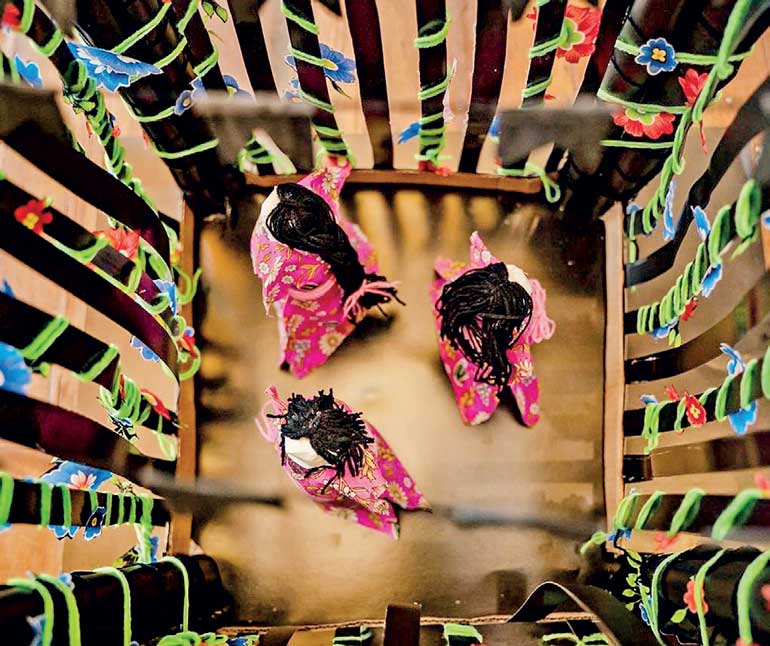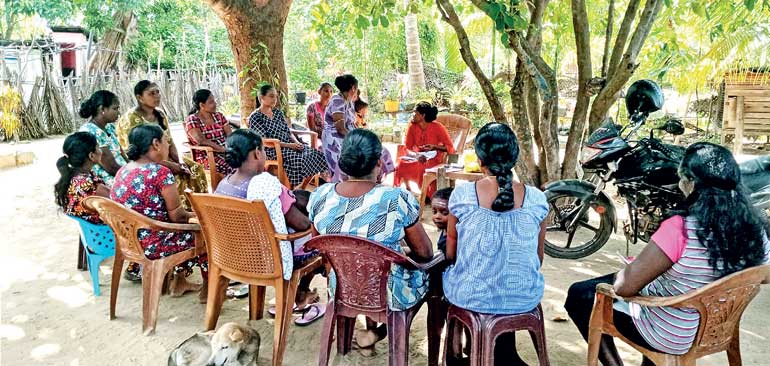Monday Feb 23, 2026
Monday Feb 23, 2026
Tuesday, 26 July 2022 01:47 - - {{hitsCtrl.values.hits}}


Empty streets, shuttered storefronts. Fields, more brown than green. An eerie quietness, as a stray dog wanders around in search of scraps of food. A mother sits on her front stoop, head in her hands. Scattered in front of her are beautiful handmade pieces of pottery – her sole livelihood. Inside, her children toss on mats listlessly, their stomachs hollow as they go yet another day without a full meal.
Ever since the Government imposed a COVID-19 lockdown, their mother has been unable to sell her wares. She doesn’t dare step out onto the street, and her customers have bigger things to worry about. They’ve heard from a neighbour that some families in another village have been given relief packs. But no one has come for them yet. She gazes fearfully down the street, eyes searching for the person she dreads the most. She had never planned to be indebted to anyone but the war left her without options.
Similar stories echo across all war-affected areas in Sri Lanka, as many women resorted to microfinance as a way forward following the war. However, due to very little financial literacy and increased vulnerability, especially in the case of post-war female heads of households, many of them signed up for loans with very little understanding of the consequences. The outbreak of the COVID-19 pandemic in 2020 and resulting loss of income or livelihood placed an additional burden on these women, making loan repayment even more difficult.
To understand the impact of COVID-19 on women borrowers, the Centre for Equality and Justice (CEJ) conducted a research study in the Kilinochchi, Ampara and Hambantota districts. Data collection was conducted by way of interviews and focus group discussions. Of the interviewees, 30 were women borrowers, and 15 were stakeholders. All the women interviewees unanimously stated that COVID-19 negatively impacted their repayment abilities. Though many of them found it difficult to quantify the impact of the pandemic, they were able to recount and describe specific instances in which COVID-19 affected their loan repayment abilities.
Of the women interviewed, many of them explained that before the pandemic, even though they struggled, most times they were able to pay off the loan instalment on time. With the outbreak of the pandemic and subsequent lockdowns, this became impossible. In most cases, loan repayments became the least of their concerns as putting food on the table and caring for their families took up much of their attention.
In most cases, the women interviewees spoke of the loss of livelihood or income as the main impact of the pandemic. “The materials for my garland, that is, the flowers, are brought in from Nuwara Eliya in the bus. Since bus services were restricted during COVID-19, I was unable to purchase flowers. I used to buy flowers and make flower garlands for temples and weddings. Because of COVID-19, there were no weddings and the temples were closed as well. My livelihood was completely affected. As a result, I couldn’t repay the loans. I struggled to find the money for meals. My husband is a labourer. He couldn’t go for a job as well,” one woman from the Ampara district said.
Access to livelihood worsened when the women and their families contracted COVID-19 and had to quarantine or isolate. Such periods of isolation made it impossible for these women to continue their day-to-day subsistence. Due to this, loan payments too were delayed. One woman interviewee shared, “My husband and I are daily wage labourers. We did not get a job during the COVID-19 period. We provided food for our children amidst many difficulties with the help of neighbours. But we contracted COVID too. After 14 days of isolation and travel restrictions, we are still working hard to repay the loan. Next we have to deal with the loan arrears.”
Many of the women stated that during this time, some microfinance companies did not grant any concessions for loan repayment, especially in the Kilinochchi and Ampara districts. Instead, they only experienced some relief when debt collectors could not come to their homes during lockdowns. “How to repay the loan amount when we are struggling to even afford meals?” a woman from Kilinochchi asked.
In instances where microfinance institutions granted concessions, often, they were in the form of delayed payments. Most women who spoke of delayed payments however saw it as more of a curse than a blessing. “I had to pawn my elder daughter’s small gold chain and her two earrings to pay the loan instalments,” one woman from the Hambantota district lamented.
Several of the women interviewed were the heads of their households or sole wage earners. Though the pandemic certainly had an impact on the financial status of these women, many of them were struggling with microfinance-related issues even before the outbreak of COVID-19. A significant reason for this is the lack of government regulation of microfinance institutions (MFIs).
Regulations on interest rates, frequency of instalments and ethical recollection mechanisms must be introduced if microfinance is to be successful in the economic empowerment of women. Additionally, MFIs must take into account the repayment capacities and income generation abilities of borrowers before granting loans. Further, women must be educated on microfinance programs to ensure that they are fully informed when consenting to loans.